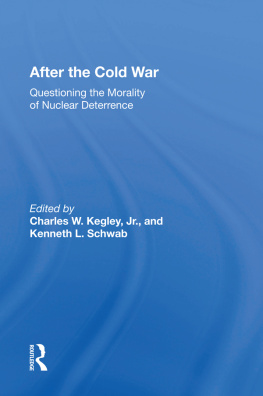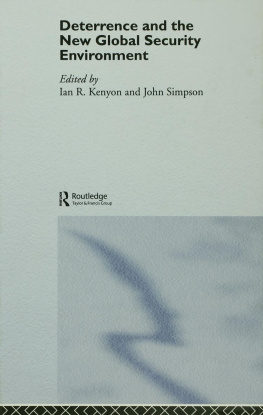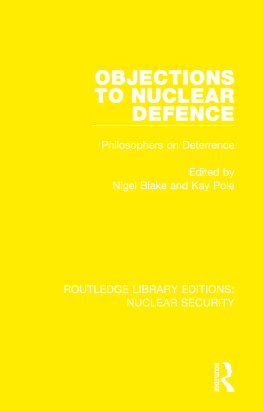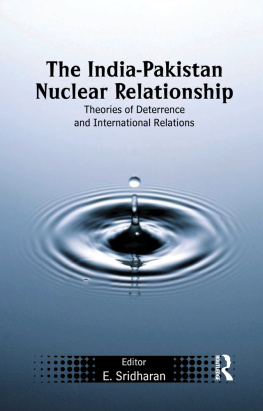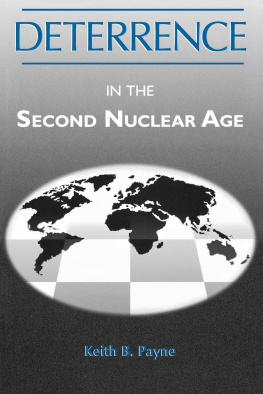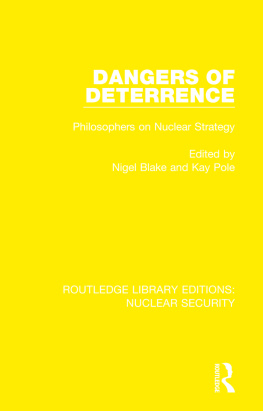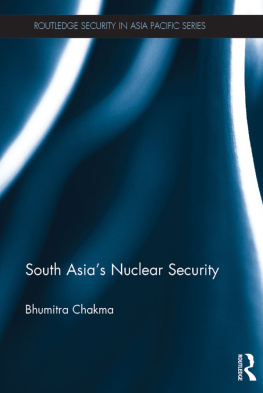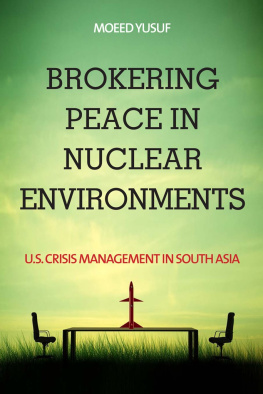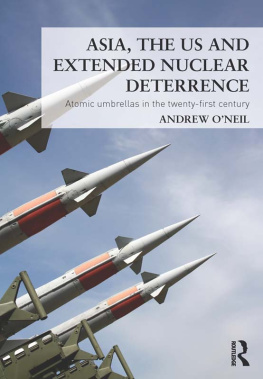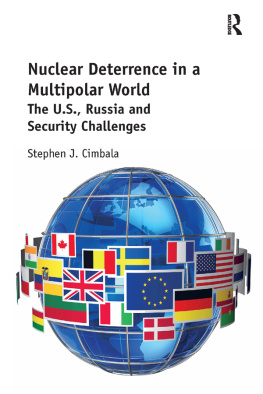First published in 1991 by Westview Press
Published in 2021 by Routledge
605 Third Avenue, New York, NY 10017
2 Park Square, Milton Park, Abingdon, Oxon OX14 4RN
Routledge is an imprint of the Taylor & Francis Group, an informa business
Copyright 1991 by Taylor & Francis
All rights reserved. No part of this book may be reprinted or reproduced or utilised in any form or by any electronic, mechanical, or other means, now known or hereafter invented, including photocopying and recording, or in any information storage or retrieval system, without permission in writing from the publishers.
Notice:
Product or corporate names may be trademarks or registered trademarks, and are used only for identification and explanation without intent to infringe.
Library of Congress Cataloging-in-Publication Data
After the cold war : questioning the morality of nuclear deterrence /
edited by Charles W. Kegley, Jr., and Kenneth L. Schwab.
p. cm.
ISBN 0-8133-8063-4ISBN 0-8133-8064-2 (pbk.)
1. Nuclear warfareMoral and ethical aspectsCongresses.
2. Deterrence (Strategy)Moral and ethical aspectsCongresses.
World politics1985-1995Congresses. I. Kegley, Charles W., Jr.
II. Schwab, Kenneth L.
U263.A29 1991
172.422dc20
90-44539
CIP
ISBN 13: 978-0-3670-1592-3 (hbk)
ISBN 13: 978-0-3671-6579-6 (pbk)
DOI: 10.4324/9780429045783
Contents
Charles W. Kegley, Jr., and Kenneth L. Schwab
PART I
THE VIEWS OF POLICYMAKERS AND STRATEGIC THEORISTS
2 Military Power and the Passing Cold War
Richard Perle
3 What Stakes Would Justify the Use of Weapons of Mass Destruction?
Sir Hugh Beach
4 Now More Than Ever: No First Use
Paul C. Warnke
PART II
THE VIEWS OF POLICY ANALYSTS AND PEACE RESEARCHERS
5 Deterrence, Nuclear Weapons, Morality, and War
John Mueller
6 What Power Do Nuclear Weapons Give Their Possessors? The Basic Instability of Deterrence
Kenneth E. Boulding
7 MAD (Minimum Assured Deterrence) Is Still the Moral Position
Paul M. Kattenburg
8 An Acceptable Role for Nuclear Weapons?
Bruce Martin Russett
PART III
THE VIEWS OF MORAL PHILOSOPHERS AND RELIGIOUS LEADERS
9 Ordering Our Destiny: Politics, Strategy, and Ethics
Joseph Cardinal Bernardin
10 From Pacifism to Apocalyptic Visions: Religious Perspectives on Nuclear Deterrence
Janice Love
11 Can Contemporary War Be Just? Elements in the Moral Debate
James Turner Johnson
PART IV
NEW THINKING ABOUT OLD QUESTIONS
12 On the Scholarly Study of Nuclear Deterrence: Historical Roots of the New Discourse
Steven W. Hook and William A. Clark
13 The Post-Cold War Context: The Contributors Dialogue in Perspective
Jonathan Davidson
References
- Part I The Views of Policymakers and Strategic Theorists
- 2 Military Power and the Passing Cold War
- 3 What Stakes Would Justify the Use of Weapons of Mass Destruction?
- 4 Now More Than Ever: No First Use
- Part II The Views of Policy Analysts and Peace Researchers
- 5 Deterrence, Nuclear Weapons, Morality, and War
- 6 What Power Do Nuclear Weapons Give Their Possessors? The Basic Instability of Deterrence
- 7 MAD (Minimum Assured Deterrence) Is Still the Moral Position
- 8 An Acceptable Role for Nuclear Weapons?
- Part III The Views of Moral Philosophers and Religious Leaders
- 9 Ordering Our Destiny: Politics, Strategy, and Ethics
- 10 From Pacifism to Apocalyptic Visions: Religious Perspectives on Nuclear Deterrence
- 11 Can Contemporary War Be Just? Elements in the Moral Debate
- Part IV New Thinking About Old Questions
- 12 On the Scholarly Study of Nuclear Deterrence: Historical Roots of the New Discourse
- 13 The Post-Cold War Context: The Contributors Dialogue in Perspective
- References
We know today that ideas, not armaments, will shape our lasting prospects for peace; that the conduct of our foreign policy will advance no faster than the curriculum of our classrooms; that the knowledge of our citizens is one treasure which grows only when it is shared.
President Lyndon B. Johnson
The revolutionary year 1989 stands as a true historical watershed. Communisms collapse in Eastern Europe, the fragmentation of the Warsaw Pact (and, potentially, the Soviet Union itself), the progress in arms control, and the outbreak of peace generally seemed, to many, to set the stage for a new era of world politics. What began with the hope to move beyond the Cold War culminated in awareness that a new international systemcontrary to most predictions and to the surprise of nearly all observershad become a reality.
Change poses both promise and peril. What the emergent new global architecture will mean for world politics is highly uncertain. Particularly problematic among the many questions that the post-postwar era presents is the most pressing question of our time: Will the peace among the great powers that has continued without interruption since 1945 persist in the new global atmosphere created by these rapidly converging developments? It is the purpose of After the Cold War to address the fundamental strategic issues presented by the new global environment and to take a critical look at the morality and efficacy of that core pillar of peacenuclear deterrencein the new geopolitical context.
As we enter this new era, it is imperative to reconsider the superpowers military doctrines, the moral dilemmas they pose, and how the extraordinary global changes may affect the prospects for nuclear deterrence and, ultimately, abiding peace. The questions of whether deterrence will be a cure or a curse and whether a system that requires mass annihilation for defense remains morally defensible are presently approached from widely disparate vantage points.
At the risk of oversimplification, three categories of observers may be distinguished: (1) policymakers and strategic theorists, (2) policy analysts and peace researchers, and (3) moral philosophers, religious leaders, and peace activists. Each of these groups is actively engaged in the continuing debate about nuclear weapons, and their divergent perspectives enlarge awareness of the issues to be confronted. But rarely have their views been brought together and their conclusions exposed for critical comparison. That need is more urgent than ever, because the end of the Cold War does not end the urgent need to find a basis for preventing nuclear war. The new global circumstances now require, more than ever, reexamination of conventional wisdom and established policy prescriptions.
To cover comprehensively the full range of opinion concerning these complex issues (and expose the diversity of opinion within each community of commentators) is well beyond the reach of a single volume. But a representative sample of thought on this subject by leading authorities within each school is possible, and perusal of their competing viewpoints can illuminate the similarities and differences within and across the three groups. It is the purpose of

